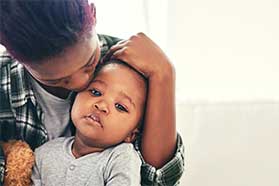Bronchiolitis Treatment in Dallas, TX

Bronchiolitis is a common viral infection in young children and infants, causing inflammation and congestion of the small airways in the lungs (bronchioles). These airways are used for controlling airflow in your lungs and, when infected or damaged, they can swell or become clogged, blocking the flow of oxygen and causing wheezing and breathing difficulty in young children.
Bronchiolitis symptoms in children and adults warrant medical intervention. To schedule a consultation with a qualified healthcare provider in Dallas that specializes in bronchiolitis treatment, call (817) 203-2760 or contact The New You Medical & Infusion Clinic online.
Bronchiolitis Causes & Risk Factors
The most common cause of bronchiolitis is due to a viral infection and is usually caused by the respiratory syncytial virus (RSV), with common outbreaks occurring in winter months and affecting children under the age of 1. Bronchiolitis, presenting breathing difficulty in children whose immune systems are delicate, is considered to be more serious of an illness than bronchitis is for adults. Infants aged 3 months are at the greatest risk for bronchiolitis due to their lungs and immune systems not being fully developed. Additional risk factors include:
- Premature birth
- Underlying heart or lung condition
- Depressed immune system
- Exposure to tobacco smoke
- Never breast-fed (breast-fed babies receive important immune benefits from their mother)
- Crowded living environment
- Having siblings who attend school or childcare center and can bring home infection
A very rare and dangerous condition, bronchiolitis obliterans, is a form of bronchiolitis that presents in adults and causes scarring in the bronchioles, blocking the air passages and creating an irreparable airway obstruction.
Bronchiolitis Symptoms
Both viral bronchiolitis and bronchiolitis obliterans present similarly. The most common bronchiolitis symptoms include:
- Runny, stuffy nose
- Cough
- Wheezing
- Shortness of breath
- Slight fever
- Fatigue
- Otitis media (ear infection)
If your child has difficulty eating or drinking, or his or her breathing becomes labored, it is important to seek medical treatment. Additional bronchiolitis symptoms which warrant prompt medical treatment include vomiting, fast or labored breathing or a bluish appearance in the skin (especially in the lips and fingernails).
Bronchiolitis Diagnosis
Your healthcare provider can identify a problem by listening to your child's lungs with a stethoscope to identify abnormal breathing. He or she may also check for signs of dehydration including sunken eyes, dry mouth and skin, sluggishness and little to no urination. Because bronchiolitis presents similarly to the cold and flu, additional diagnostic tests may be recommended and may include:
- Chest X-ray to inspect for signs of pneumonia .
- Viral testing in which your healthcare provider collects a sample of mucus (taken with a cotton swab that is inserted into the nose) from your child to inspect for the virus causing bronchiolitis.
- Blood tests to inspect your child’s white blood cell count. Increased white blood cells could indicate the body is fighting infection. A blood test can also determine whether oxygen levels have decreased in your child’s bloodstream.
Bronchiolitis Treatment
Most children diagnosed with bronchiolitis can be treated at home with supportive care. Antibiotics are not typically helpful in treating bronchiolitis as the infection is viral. If the cause is associated with bacterial infection, however, such as pneumonia, your healthcare provider may recommend an antibiotic. Medications may be prescribed to help open the airways (bronchodilators), though these haven't been found to be routinely helpful; your healthcare provider might alternatively try a nebulized albuterol treatment.
For severe cases of bronchiolitis, hospitalization may be required to receive humidified oxygen in order to maintain sufficient oxygen in the blood or fluids through a vein (intravenously) to prevent dehydration. A tube may be attached into the windpipe (trachea) in severe cases to help the child's breathing.
If you are an adult who has contracted bronchiolitis obliterans, unfortunately there is no cure. Corticosteroids can help clear the lungs of mucus, reduce inflammation and open up your airways. You might need oxygen treatment and immunosuppressant medications to regulate your immune system, while a lung transplant may be the best option in the most severe cases.
Schedule a consultation with a qualified healthcare provider in Dallas that specializes in bronchiolitis treatment. Call (817) 203-2760 or contact The New You Medical & Infusion Clinic online.
The New You Medical & Infusion Clinic
Address
100 Grapevine HwyHurst, TX 76054
(817) 203-2760
https://www.newyoumedclinic.com/
Hours
Mon:
10:00 am - 6:00 pm
Tue:
10:00 am - 6:00 pm
Wed:
10:00 am - 6:00 pm
Thu:
10:00 am - 6:00 pm
Fri:
Closed
Sat:
Closed
Sun:
Closed

